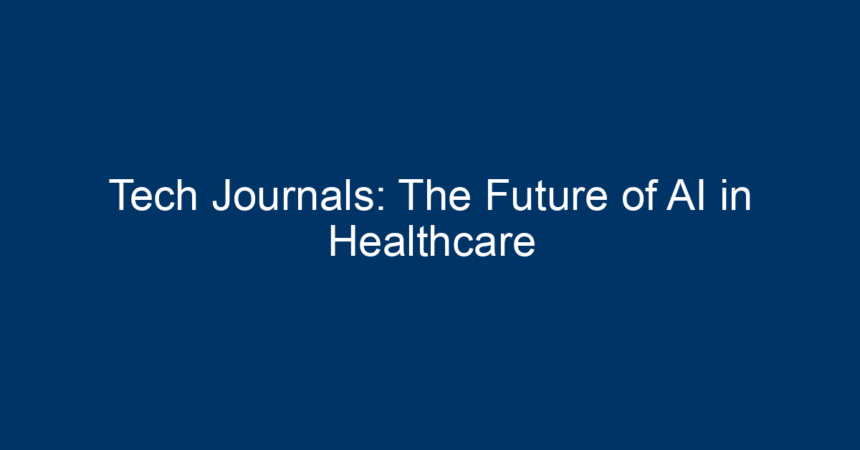Introduction
The advent of artificial intelligence (AI) has signaled a transformative era across various sectors, with healthcare standing as one of the most significantly impacted fields. As tech journals increasingly publish groundbreaking studies and insights focusing on this synergy, the medical landscape is evolving at an unprecedented rate. AI isn’t just a buzzword; it’s reshaping diagnostics, treatment protocols, patient engagement, and operational efficiency. This article delves deep into the future of AI in healthcare, drawing insights from reputable tech journals and exploring potential trajectories that could redefine patient care and medical research.
Understanding AI in Healthcare
AI encompasses a range of technologies, including machine learning, natural language processing, and robotics, all designed to analyze and interpret complex datasets. The primary objective of AI in healthcare is to enhance precision, speed, and accessibility in medical services. According to various tech journals, integrating AI into healthcare systems can streamline workflows, improve diagnostic accuracy, and foster personalized patient care.
Evolution of AI in Medical Diagnostics
Historically, diagnosing medical conditions relied heavily on clinicians’ expertise and experience. However, recent advancements in AI, as documented in leading tech journals, demonstrate its capability to analyze vast datasets from medical imaging, genomic information, and electronic health records. For instance, algorithms can now analyze X-rays and MRIs with accuracy comparable to seasoned radiologists.
Case Studies of AI Success
Several tech journals have reported successful implementations of AI in diagnostics:
- Google Health’s DeepMind: Demonstrated its prowess in detecting breast cancer in mammograms, surpassing human radiologists in accuracy.
- IBM Watson: While initially met with challenges, its potential in analyzing patient data and recommending treatment options has showcased the need for human-AI collaboration.
These examples illustrate how AI can augment healthcare professionals’ abilities, providing them with tools that enhance their decision-making processes.
AI in Personalized Healthcare
The concept of personalized medicine aims to tailor treatments to individual patients based on their unique genetic profiles, lifestyle, and preferences. Tech journals reveal that AI is playing a pivotal role in this paradigm shift.
Genomics and AI Integration
With the plummeting cost of genomic sequencing, the volume of genomic data is skyrocketing. AI algorithms can process this information rapidly, unveiling patterns that inform targeted therapies. Insights published in tech journals suggest that AI’s ability to predict patient responses to treatments can lead to more effective healthcare interventions.
Enhancing Patient Engagement
AI-driven chatbots and virtual health assistants are stepping into the spotlight, transforming patient engagement strategies. Tech journals highlight how AI tools help patients book appointments, receive reminders, and even manage chronic diseases by tracking health metrics. By enabling continuous communication, these innovations not only enhance patient satisfaction but also encourage adherence to treatment plans.
Streamlining Operational Efficiency
The integration of AI in healthcare also holds the promise of operational improvements. From administrative tasks to supply chain management, tech journals indicate that AI is streamlining processes that once consumed significant resources.
Reducing Administrative Burden
Healthcare facilities often grapple with overwhelming administrative duties. AI technologies can automate processes such as scheduling, billing, and even insurance claims processing. This alleviation allows healthcare providers to allocate more time to patient care, ultimately improving the quality of service.
Optimization of Resource Allocation
AI’s predictive analytics capabilities can analyze patient admission rates, staffing needs, and inventory levels to optimize resource allocation. As detailed in various tech journals, hospitals employing AI-driven management systems have observed significant reductions in operational costs while enhancing patient outcomes.
Ethical Considerations and Challenges
While the buzz around AI in healthcare is promising, it brings forward a set of ethical concerns and challenges. Tech journals frequently discuss the implications of data privacy, algorithmic bias, and the potential for job displacement.
Data Privacy and Security
Patient data is highly sensitive, requiring stringent security measures. The integration of AI necessitates a careful approach to data handling, as breaches can lead to severe consequences. Healthcare providers must ensure compliance with regulations such as HIPAA (Health Insurance Portability and Accountability Act) to safeguard patient information.
Addressing Algorithmic Bias
If AI algorithms are trained on biased data, they can perpetuate existing inequalities in healthcare. Tech journals emphasize the need for diverse datasets to train AI systems to ensure equitable healthcare access and outcomes for all demographics.
Navigating the Future Workforce
Concerns over job displacement, particularly among administrative and diagnostic roles, are prevalent. However, many experts argue that AI will serve more as a tool to enhance human capabilities rather than replace them entirely. Training and upskilling the workforce will be essential as healthcare continues to evolve.
The Role of Tech Journals in Shaping the Future
Tech journals play a crucial role in disseminating knowledge about AI’s potential in healthcare, offering researchers, practitioners, and policymakers the insights needed to make informed decisions. By reporting on breakthroughs, challenges, and case studies, these publications serve as a bridge connecting technological innovations with real-world applications.
Fostering Collaboration
By providing a platform for discourse on research findings and technological advances, tech journals foster collaboration among stakeholders in the healthcare ecosystem. This engagement is vital for aligning goals and ensuring successful implementation of AI solutions.
Conclusion: Actionable Insights for Stakeholders
As we gaze into the future of AI in healthcare, several actionable insights emerge for stakeholders, including healthcare providers, technology companies, and policymakers:
-
Embrace Continuous Learning: Stakeholders should invest in education and training programs to equip healthcare professionals with the skills needed to work alongside AI.
-
Prioritize Ethical Standards: Establishing ethical guidelines for AI deployment must be a priority to ensure data privacy, security, and equity in patient care.
-
Collaborate Across Sectors: Encouraging collaboration between technology developers and healthcare practitioners will foster innovative solutions that genuinely address patient needs.
- Stay Informed Through Tech Journals: Regularly engaging with articles and studies in tech journals will keep stakeholders updated on advancements, challenges, and best practices in AI and healthcare.
As the journey unfolds, the intersection of AI and healthcare presents a rich landscape of opportunities, challenges, and transformative potential. By remaining engaged and informed, we can collectively contribute to a future where technology enhances human health and well-being.




